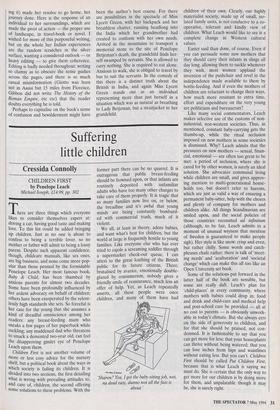Suffering little children
Cressida Connolly
CHILDREN FIRST by Penelope Leach Michael Joseph, £14.99, pp. 302 There are three things which everyone likes to consider themselves expert at: driving a car, having good taste and making love. To this list could be added bringing up children. Just as no one is about to confess to being a terrible lover, so no mother or father will admit to being a lousy parent. Despite such apparent confidence, though, childcare manuals, like sex ones, are big business, and none come more pop- ular than those penned by the formidable Penelope Leach. Her most famous book, Baby & Child, has been thumbed by anxious parents for almost two decades. Some have been profoundly influenced by her ardent advocacy on behalf of children; others have been exasperated by the relent- lessly high standards she sets. So forceful is her case for the young that she assumes a kind of dreadful omniscience among her readers: any breast-feeding mum who sneaks a few pages of her paperback while suckling; any maddened dad who threatens to smack a demented two-year old, can feel the disapproving gimlet eye of Penelope Leach upon them.
Children First is not another volume of more or less cosy advice for the nursery shelf, but a political book about the ways in which society is failing its children. It is divided into two sections, the first detailing what is wrong with prevailing attitudes to, and care of, children, the second offering some solutions to these problems. With the
former part there can be no quarrel. It is outrageous that public breast-feeding should be frowned upon, or that infants are routinely deposited with unfamiliar adults who have too many other charges to take care of them properly. It is tragic that so many families now live on, or below, the breadline and it's awful that young minds are being constantly bombard- ed with commercial trash, much of it violent.
We all, at least in theory, adore babies, and want what's best for children, but the world at large is frequently hostile to young families. Like everyone else who has ever tried to cajole a screaming toddler through a supermarket check-out queue, I can attest to the great loathing of the British public for its future citizens. There, brutalised by avarice, emotionally double- glazed by consumerism, nobody gives a friendly smile of reassurance, much less an offer of help. Yet, as Leach repeatedly asserts, all these people were once children, and many of them have had `Sharon? Yea, I got the baby-sitting job, wot, na dead easy, dunno wot all the fuss is about.' children of their own. Clearly, our highly materialist society, made up of small, iso- lated family units, is not conducive to a co- operative, tolerant and kindly view of children. What Leach would like to see is a complete change in Western cultural values.
Easier said than done, of course. Even if you can persuade some new mothers that they should carry their infants in slings all day long, allowing them to suckle whenever they wish, most women applaud the invention of the pushchair and revel in the independence made available to them by bottle-feeding. And if even the mothers of children are reluctant to change their ways, how much more resistant to extra time, effort and expenditure on the very young are politicians and bureaucrats?
Like many social commentators, Leach makes selective use of the customs of non- industrial, non-western societies. Thus, as mentioned, constant baby-carrying gets the thumbs-up, while the ritual seclusion imposed on new mothers in some societies is dismissed. Why? Leach admits that the pressures on new mothers — sexual, finan- cial, emotional — are often too great to be met: a period of seclusion, where she is cared for by other women, is surely an ideal solution. She advocates communal living while children are small, and gives approv- ing mention to multi-generational house- holds too, but doesn't refer to harems, which are just as valid a way of ensuring a permanent baby-sitter, help with the chores and plenty of company for mothers and children alike. All things Scandinavian are smiled upon, and the social policies of those countries recounted ad infinitum (although, to be fair, Leach admits in a moment of unusual wryness that mention of Sweden is guaranteed to make people sigh). Her style is like snow: crisp and even, but rather chilly. Some words and catch- phrases chafe rather: there is talk of 'meet- ing needs' and `aculturation' and 'societal change' which can make this all too like an Open University set book.
Some of the solutions put forward in the latter half of the book are sensible, but some are really daft. Leach's plan for `child-places' in every community, where mothers with babies could drop in; food and drink and child-care and medical help and post-school care be provided — all at no cost to parents — is obviously unwork- able in today's climate. But she always errs on the side of generosity to children, and for that she should be praised, not con- demned. It is fashionable to say that you can get more for less: that your houseplants can thrive without being watered; that you can lose inches from hips and waistlines without eating less. But you can't. Children First should be called Put Children First, because that is what Leach is saying we must do. She is certain that the only way to get more for our children is by doing more for them, and unpalatable though it may be, she is surely right.


















































 Previous page
Previous page